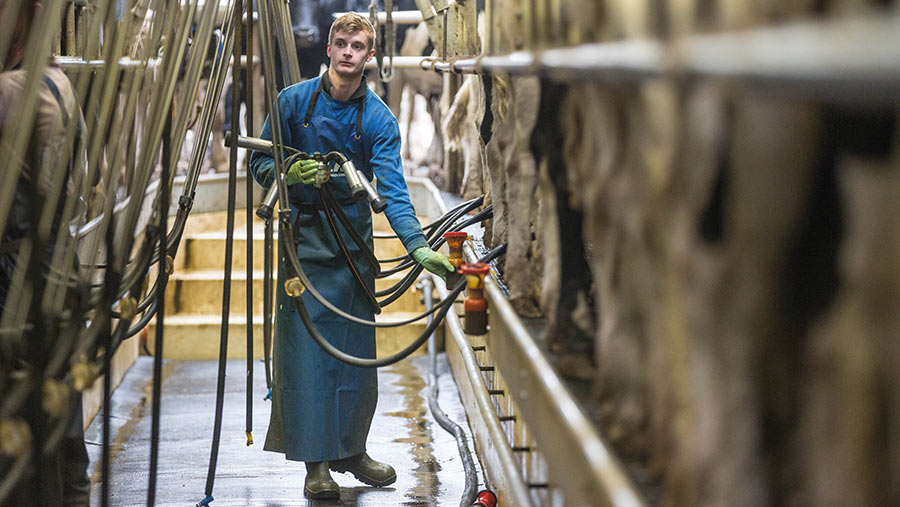How farmers can bust 4 common myths about working in ag
 © Tim Scrivener
© Tim Scrivener The post-Brexit era and the impact of Covid-19 have had many people across the country questioning careers and work-life balance.
Some have chosen to continue to work from home, turning their backs on long, busy, and uncomfortable commutes.
Many have turned to the countryside for fresh air and fresh perspective on their lives and are now seeking out new careers and opportunities. So, why aren’t they choosing to work in farming?
People consultant Paul Harris, from Real Success, addresses four potential misconceptions from those outside the agricultural industry and considers how farmers can overcome them.
See also: How to reduce staff working hours on dairy farms
1. The working conditions in farming are dirty, dangerous, and depressing
If you’re working with livestock, yes, it can be messy. But that doesn’t need to be the only impression we give.
Cleanliness isn’t impossible to achieve and, while a sparkling parlour may not impress the cows, it does instill a sense of pride in the team.
If you also provide some corporate clothing, a washing and drying facility, and somewhere safe and pleasant to have a break, farming can compete with alternative industries.
Ignoring health and safety rules because you don’t believe in helmets being worn on quadbikes doesn’t make you an attractive prospect for a school leaver with an anxious parent.
So, treat good working conditions and a safe farm as top priorities.
2. The working hours are too long, and you never get weekends off
From significant business choices such as reducing the number of milkings a day, to employing more staff, it is possible to create a more regular and manageable working pattern that may be more attractive to UK workers.
If you are milking three times a day, the evening or night shift is often the most unpopular.
You can alternate rotas so the night shift isn’t the only shift you offer to someone. Flexible working can also offer people some time off in the day.
You could offer incentives for the less sociable shifts, such as extra time off in lieu, or simply take a lighter approach to evening and weekend work.
3. Farming is for the poorly educated
Farming offers an abundance of opportunities for those who are scientifically or engineering-minded, as well as livestock or machinery focused.
The “on-the-job” training in farming is far greater than many other industries and there is space to grow your skills on a farm and the associated industries.
Does your farm participate in Open Farm Sunday? Do you offer to speak at careers evenings? Have you spoken to the principals of schools and colleges in your area and offered to have an open day when they can bring students along to see what happens on a farm?
4. The only way into farming is if your family already owns a farm or has a tenancy
The vast majority who work in agriculture work for someone else – just like all other industries. And it can be one of the best-paid industries to work in.
If you are a school or college leaver, you may be provided with accommodation, which means you have no rent or mortgage.
An experienced herdsperson or farmworker could typically earn £25,000-£30,000/year (or more), but if you add the “value” of mortgage or rent payments, this can easily add another £10,000-£15,000 to a package.
So, an employee, often young, could be earning the equivalent of £35,000-£45,000/year. This is ahead of many industries.
If you work in the industry for a while and save some of your earnings, you could then invest these savings into property or cows.
You could eventually look at contract-farming arrangements and other ways to get partially invested in a farm.
Conclusion
All of us who work within agriculture must talk about how farming offers a safe, challenging, well-paid career where training is extensive, opportunities for progression are vast and the lifestyle can be exactly what many have yearned for over the past 18 months of the pandemic.
Farmers should “talk up” our industry rather than being seen as grumpy individuals that constantly moan.
It’s too easy to blame governments, the NFU and AHDB for not promoting our industry to young people, UK workers and those outside the industry.
It’s time we all took a big step forward and owned this issue ourselves.
Paul Harris is the managing director of Real Success – a people consultancy that helps the agricultural sector to improve staff management. A regular speaker at industry events, Mr Harris is widely recognised as a thought leader and positive advocate of staff development in the agricultural sector
